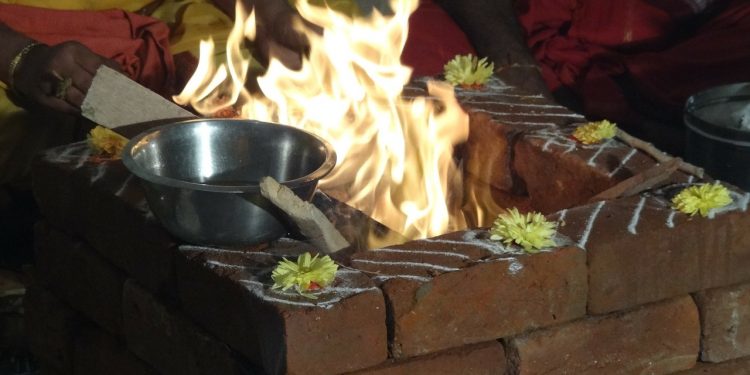The Religious Row: An Overview of the Recent Controversy Over Religious Conversion

The recent row over the religious conversions, or more aptly, “re-conversions” in India, seemed to have spiked a great interest in the parliament and the media. What the issue translates into is still a big question and will play a huge role in defining India’s religious stand.
The Issue
Two hundred, allegedly unsuspecting, poor Muslim rag pickers in a slum area in Agra were converted ‘back’ to Hinduism as a part of ‘Ghar-Vapasi’ program. Apparently, local Hindu activists associated with right wing Hindu extremist groups initiated the ceremony.
Varying reports of the incident, ranging from people reporting that they were fooled into converting, to people saying that the re-conversion was completely voluntary, have flooded the media since then. Fifty-seven families at least have though, reported that they were lured or bluffed into the ceremony by the promise of ration cards. The ceremony, complete with Hindu rituals, ‘havans’, ‘skull caps’ and the whole works have left an aura of fear draped over the area. After this particular issue, other regions that saw religious disturbances in the recent months, like Muzaffarnagar and the Trilokpuri area in East Delhi became tense. Armed forces were deployed in the slum area in Agra itself as a precautionary measure.
The Parliament Discussion
This matter gained quite a lot of prominence in the parliament, as Jyotiraditya Scindia put it. The matter was discussed amidst a lot of heat in the parliament with the Congress, AAP, BSP, TMC, and other parties, bombarding the government with questions and accusations, putting the right wing extremist fringe like RSS and Shiv Sena under the light.
According to Scindia, RSS stated that the central government is under their control. Bold accusations were made on the central government stating that these Hindutva groups were receiving encouragement from the centre. Shiv Sena’s MP used the case of Tara Sahdev, Indian shooter, who was converted to Islam, as a counter and a defense that conversions have been taking place for a long time; why this sudden commotion? It was also suggested that conversions be banned, or at least be supervised and permitted by the DM of the area concerned, verifying if the conversion is a voluntary one or not.
What to Make of It?
Well, since the ‘Agra incident’, numerous reports on the way the ‘Hindutva brigade’ seems to be parading across the country have come into light. Niranjan Jyoti’s abusive speech asking people to choose between ‘ramzadon’ and ‘haramzadon’ , Sakshi Maharaj, calling Mahatma Gandhi’s killer, a patriot and the visible change in the country’s atmosphere where Hindu bodies seem to have become emboldened in their ‘crusade for a Hindustani’ country are unfortunate. The recent activities (atrocities, you may call it) by self declared moral policing and ‘love jihad pose a serious threat to India’s secularism. The question that remains is: Are we headed towards a theocratic country?
The image of our PM, which was projected extensively as the ‘development-man’ so much so that any association of the man in the Gujarat 2002 anti-Muslim riots faded away completely from the minds of people, strengthened his image as the best bet for India’s development. However, with such incidents coming to light, people can’t help but think whether the projected image of the PM was just an excellent job done by his PR department and that the ‘development man’ image is supposed to veil the relations with the extremist Hindu fringe, which will continue to receive protection and provision under the BJP rule. Or, is this situation a great game plan by the opposition parties to taint, effectively so, the pretty picture of the ‘achche din’ Modi had been painting?
With provocative speeches and Yogi Adityanath’s defiant stand, even after the Agra issue, to lead the mega-event in Aligarh on 25th December where 4000 Christians and Muslims will be ‘re-converted’ to Hinduism, the situation is sensitive. “Aligarh has been chosen as it is time we wrest the Hindu city from the Muslims” a statement made by RSS pracharak, Rajeshwar Singh; “We will cleanse our Hindu society. We will not let the conspiracy of the Church or mosque succeed in Bharat” make for another one of Rajeshwar Singh’s questionable statements. A similar statement was made by VHP (Vishwa Hindu Parishad) activist, Mahant Ramchandra Paramhans, taking pride in his group’s role in changing Ayodhya’s secular status to a ‘rightfully’ Hindu projection, in the context of Babri masjid case in Ayodhya.
Statements like these pose a dire threat to the nation’s integrity. It is on religious stands, that every war in India has ripped the country apart, be it in riots in Bengal in 1905, Hindu-Muslim riots in 1946, or the 2002 Gujarat anti-Muslim riots, or the many recent disturbances in various regions like Muzaffarnagar and Trilokpuri. Our country has seen some major advancement, but it is the most basic, the oldest and the yet unsolved issue of religious disparity that hangs like a dagger over the necks of India’s progress.
Why Convert?
“Conversion only changes an individual’s way of worshipping idols, but it does not change his economical situation.” This, however, is not the present reality, given that most conversions are fuelled by a lure for money, various incentives, some for the promise of a better life, a better education. Many Dalits, seem to have converted to Islam in hopes for the equality that they were deprived of in their discriminating caste-based Hindu religion. Moreover, the fact that most reservations in different fields in India are made on the basis of religion and caste, definitely doesn’t hurt.
What Lies Ahead?
Now, it is clear that the issue has received much more attention than it would have last year; owing to BJP’s current stronghold and its past background. Whether the centre indeed is supporting such right wing Hindu extremist groups or is this incident, which according to Yogi Adityanath has been occurring for the past 10 years, being used by the opposition parties to find a fault line within the government that was going strong with the masses?
The politicization of religion however has left the people of India in a state of fear. There is another picture that can be drawn and that is a total ban on conversion, which will be a major regressive step for India. If this is the case, we will have become no different than other countries, which don’t give its people a say in choosing a religion. Banning conversion flows straight into the face of one of the most important principles India was founded on, the principle, which contributed to India’s separation from Pakistan, that India would be ‘secular.’ It might be speculated that in case of this ban, the Hindutva brigade is crushed or this is in fact a clever devise made by the BJP to quickly ban any further conversions to Islam or Christianity.
However, whether a person wants to convert to a particular religion should be his choice and a voluntary decision. Irrespective of the choice he makes, this decision must be respected and given space; and not made into a mad scramble by each religious sect competing to recruit more soldiers to their troop. Are we all pawns in an impending religious war? Apparently, we, the common man will stand helpless in the mess that is being created. But, what we can do is avoid being party to such a mess by keeping our heads straight and not be swayed by enticements or religious bantering. What we need is our sound judgment and a mind that works for a religiously harmonious secular and united India, not a religiously torn one.
[Image Attribute: PixalBay]



